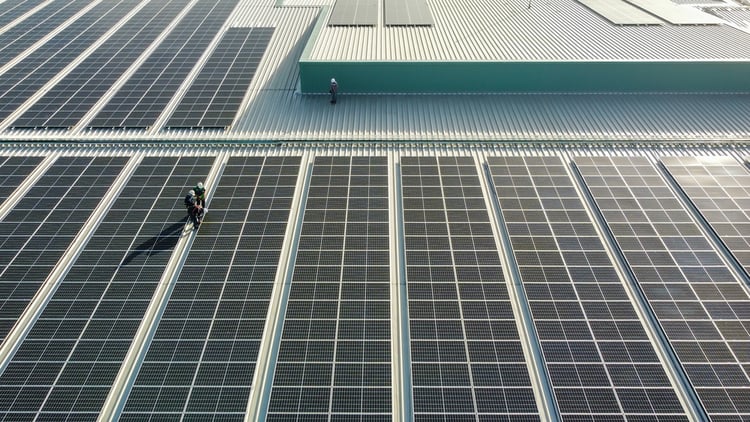Commercial building owners now have access to many green technologies, which make financial sense while reducing their carbon footprint. Solar energy has experienced rapid growth in recent years and now accounts for 50% of new generating capacity added in the US. When photovoltaic technology is combined with electric vehicle charging stations solar energy can also be used for clean and economical transportation.
Make your commercial building greener with solar panels and electric vehicle charging stations.
Inflation in the US reached a 40-year high of 8.6%, and energy products suffered some of the biggest price increases. Between May 2021 and May 2022, electricity prices increased by 12.0%, while gasoline prices increased by a drastic 48.7%. However, expensive electricity improves the business case for adopting solar energy, while expensive gasoline improves the business case for electric vehicles charged with renewable sources.
Commercial Solar Panel: Typical Cost and Savings

The Solar Energy Industries Association (SEIA) is an excellent source of information on photovoltaic technology and its publications include the quarterly Solar Market Insight Report. According to the latest edition from June 2022, commercial solar panels have an average cost of $1.64/watt, meaning you can expect to invest around $820,000 for a 500 kW system. However, the net cost for many building owners is much lower, or even zero in some cases:
- Investment Tax Credit: You can deduct 26% of your solar energy investment as a federal tax credit on your next return. Just remember that the benefit drops to 22% in 2023 and 10% in 2024.
- Local incentive programs: Depending on where you live, there may be additional incentives for solar energy. This may include subsidies, discounts, and local tax credits or exemptions.
- Zero or low interest financing: Solar energy systems can often benefit from excellent financing terms, which means you can easily pay off the loan with savings made over time.
Assuming favorable local conditions, a 500 kW commercial solar system can generate approximately 750,000 kWh per year. In a location with an electricity rate of 16 cents/kWh, this generates annual savings of $120,000. Assuming an initial cost of $820,000 and a tax deduction of $213,200, the simple payback period is just five years. This is great when you consider that quality solar panels have a typical lifespan of 25 years or more, covered by a warranty.
Expensive Gas: Incentive for a Bigger Solar Panel with EV Chargers

The ideal size for a commercial solar panel depends on the building's consumption. Many electric companies give credit for excess generation sent to the grid (net metering), but this is typically limited by your consumption. When local solar generation exceeds consumption, most energy companies will no longer extend credit. They may offer the option to carry over credits to the next month until you need them, but energy companies that actually pay the balance in cash are extremely rare.
Adding more solar panels to an array doesn't make financial sense when your consumption is fully covered and your electric company doesn't extend additional credit. However, a solar panel expansion makes sense when you can use the additional electricity and Electric Vehicle Charging Stations are a viable option for commercial building owners.
Level 1 and Level 2 EV chargers need several hours to fully charge a vehicle, but DC fast chargers can fill a battery to 80% capacity in about 15 to 20 minutes. When a commercial building is equipped with electric vehicle charging stations, surplus electricity from solar panels can be sold to electric vehicle owners. They can recharge their EV while running errands or attending a meeting, rather than having to wait for a slow charge at home.
Qualifying for EV Charging Station Incentives
The Biden administration recently announced the Electric Vehicle Charging Action Plan , which will provide $7.5 billion in funding to deploy 500,000 electric vehicle chargers across the US. Depending on how these funds are administered in each state, commercial building owners may be able to qualify for financing. In cases where electric vehicle charging stations are installed alongside a solar panel, owners can even get financial incentives for both systems.

